Student innovations on display as Enterprise Week arrives at Imperial
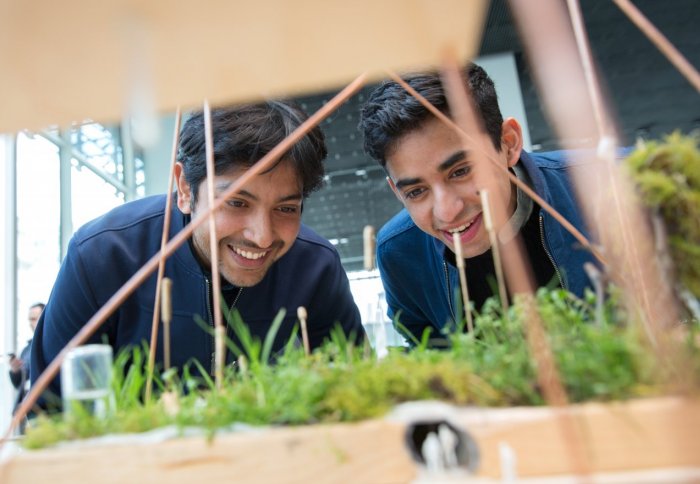
The week will feature a range of events and activities celebrating the entrepreneurial student community at the College.
A device that helps pedestrians communicate with driverless cars, a revolutionary vaccine cooling system and range of new leak-proof, organic and biodegradable menstrual pads are just some of the innovations on display at during Imperial’s Enterprise Week.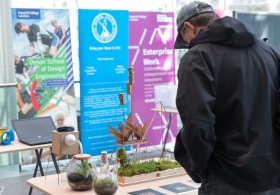
Enterprise Week brings together the range of activities that make up Imperial’s enterprise community including events from the College’s new Enterprise Lab, Imperial College Advanced Hackspace, Imperial College Business School and other academic departments.
The week has already seen the winners of the Institute of Global Health Innovation (IGHI)’s Student Challenges competition announced live on Facebook with Kitty Liao and Abellona U taking the £5000 prize for their vaccine cooling system SMILE, designed for use in rural locations in developing countries.
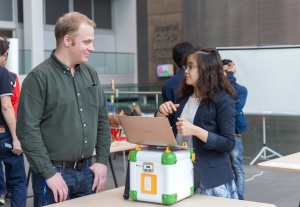
Kitty and SMILE
The current system of vaccine delivery is not reliable enough to cool vaccines properly and deliver them safely on the last mile of their journey which typically lasts five to seven days.
SMILE aims to address these problems using a temperature controlled device to maintain a vaccines temperature over the whole last mile journey and guarantee vaccines are delivered in a usable condition.
Albellona said: “We are very grateful to IGHI for organising this competition and encouraging students to work on innovative solutions to tackle global health challenges. We will work hard to bring SMILE to the real world.”
Other highlights of the week include:
Imperial College Advanced Hackspace Demo Day: Tuesday 21 – Friday 24 March
Imperial College Advanced Hackspace (ICAH) gives students and staff access to a variety of workshops and labs across the College, enabling them to use a range of equipment and opening opportunities for collaboration with like-minded makers on campus.
Since September 2014, ICAH has been actively supporting students, academics, and staff in bringing their ideas to life.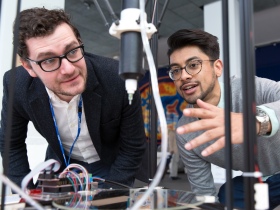
The demo day offers a chance to see a range of student innovations which have benefited from the resources, support and expertise of ICAH.
Projects on display include Moth, a sensitive sleep monitoring system that helps you create your desired sleeping cycles through non-invasive technology. Creators Sabina Weiss, Mafalda Sobral, Elena Larriba and Aaron Koshy (Dyson School of Design Engineering) hope it will be a tool for jetlag as well as for hospitals and care homes.
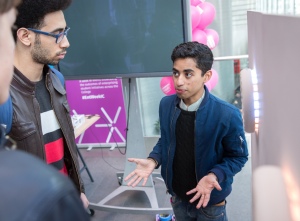
Aaron Koshy and Moth
Aaron said: “There is around an $80bn market in wearable and monitoring devices. We wanted to make a completely non-invasive device. Moth sits on your wall or your bedside table and picks up variations in your chest pattern and from there we can accurately say if you’re asleep, when you’re asleep and what stage of sleep you’re in.”
The exhibition runs in the College’s Main Entrance at the South Kensington Campus until Thursday and you can get a sneak peak of the exhibition from today’s Facebook Live Stream of the event.
Althea-Imperial Final: Tuesday 21 March
The Althea-Imperial Programme is a unique collaboration between Imperial and the Althea Foundation, a social venture fund. Now in its third year, the initiative is designed to inspire a new generation of women in science, technology and business.
This year’s finalists will pitch their ideas at Tuesday’s event in the hope of taking home the £10,000 prize.

Professor Maggie Dalman speaking at last year's Althea-Imperial Final
The finalists include Olivia Ahn’s project WithLula, a range of biodegradable, organic and leak-proof menstrual pads.
Olivia took inspiration from the way flower petals redirect water on their surface – her pads use a layered structure to send liquid into the central highly-absorbent core and away from the edges of the pad.

Olivia Ahn
Olivia said: WithLula aims to give every woman an effortless period. The pads can be shaped for their size, shape and absorbency allowing every woman to get their size instead of a one size fits all approach.
We have an app that brings everything together. The app integrates a novel period tracker. As part of the period tracker we include notifications for NHS health screening. If you’re a teenager you get notified for HPV, if you’re older you get notified for breast and cervical screenings too.”
You can watch interviews with this year’s finalists on Part One and Part Two of our Facebook Live video.
Venture Catalyst Challenge: Thursday 23 March
The Venture Catalyst Challenge is a competition for the most exciting technology and science ventures from Imperial Enterprise Lab. Following months of developing their ideas, the final seven teams - from over hundreds of entries - pitch their ideas to an audience of experts and the general public for a chance to win the £20,000 prize.
One of the finalists taking part is Blink, a communications device from Maya Pindeus, Leslie Nooteboom, Adam Bernstein and Raunaq Bose that helps pedestrians communicate with driverless cars in the way they might with a driver behind the wheel.

Blink
It uses machine learning to interpret the hand gestures of people on the road, signalling for them to either drive or move on (at a crossing, for instance).An OLED display embedded into the car windshield indicates to the pedestrian that the car is aware of their presence, so the person knows when it is safe to cross.
A full programme of Enterprise Week activities can be found on the Enterprise Lab website.
Article text (excluding photos or graphics) © Imperial College London.
Photos and graphics subject to third party copyright used with permission or © Imperial College London.
Reporter
Thomas Angus [Photographer]
Communications Division
Jon Narcross
Communications and Public Affairs